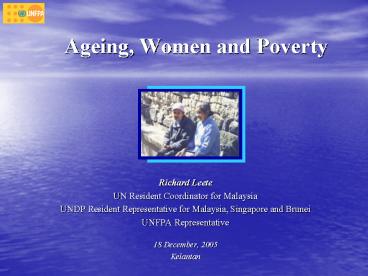Ageing, Women and Poverty - PowerPoint PPT Presentation
1 / 15
Title:
Ageing, Women and Poverty
Description:
Women comprise greater proportion of older populations disparity increases with ... European and Japanese Populations Have Heavy Concentration at Older Ages ... – PowerPoint PPT presentation
Number of Views:113
Avg rating:3.0/5.0
Title: Ageing, Women and Poverty
1
Ageing, Women and Poverty
- Richard Leete
- UN Resident Coordinator for Malaysia
- UNDP Resident Representative for Malaysia,
Singapore and Brunei - UNFPA Representative
- 18 December, 2005
- Kelantan
2
Ageing, Women and Poverty
Global Population Ageing
- Population ageing is an inevitable consequence of
the demographic transition the shift from
higher to lower levels of mortality and
especially lower levels of fertility - Because transition taking place much faster in
developing countries, population ageing is
occurring more rapidly - 2/3 of older persons live in developing countries
some 400 million persons, although proportions
higher in developed countries - Women comprise greater proportion of older
populations disparity increases with advancing
age
3
Ageing, Women and Poverty
Older Persons, Poverty and Development
- Situation of many older persons living in
developing countries one of extreme poverty - Traditional family support mechanisms eroding
- Declining family size, rural to urban migration,
declining co-residence and in some countries
younger family members dying of HIV/AIDS - Poverty experience in childhood and adulthood
likely to deepen with advancing age life cycle
of poverty - Main concerns of older poor inadequate living
conditions, access to health care and social
protection, inter-generational violence and abuse
4
Ageing, Women and Poverty
Increasing Focus on Older Poor
- Large proportions of older persons in developed
countries have attracted supportive concern but
relatively little attention in developing
countries - Past policy focus with rapid population growth
overshadowed population ageing - Population ageing increasingly seen as major
challenge in developing countries especially
where - Social safety nets do not exist, where there is
limited institutional and human resource capacity
to respond to basic needs of older persons
5
European and Japanese Populations Have Heavy
Concentration at Older Ages
Ageing, Women and Poverty
6
Malaysias Population Getting Older
Ageing, Women and Poverty
7
Share of Older Malaysians Increasing
Ageing, Women and Poverty
8
Share of Older Persons Varies by State
Ageing, Women and Poverty
9
Older Females Outnumber Males in All Ethnic
Groups, 2000
Ageing, Women and Poverty
10
Older Malaysian, Especially Women, Lacking Formal
Education, 2000
Ageing, Women and Poverty
11
Older Malaysians, Especially Women, Have Lower
Labour Force Participation Rates
Ageing, Women and Poverty
12
Older Malaysian, if Working, Likely to be in
Agriculture
Ageing, Women and Poverty
13
Ageing, Women and Poverty
Older people in Kelantan, Especially Women,
Lacking Formal Education, 2000
14
Ageing, Women and Poverty
Older People in Kelantan more likely to be
Engaged in Agriculture
15
Ageing, Women and Poverty
Conclusion
- Mainstream ageing issues into multi-sectoral
development processes, with a particular focus on
older poor - Out of Malaysias 1.5 million older persons, 14
per cent live in poverty, especially women - Ensure appropriate social services and welfare
coverage for poor and disadvantaged older
persons, most commonly women - Promote intergenerational solidarity with the
goal of maintaining and improving social cohesion
among generations - Improve data and research on situation and needs
of older persons in Malaysia

